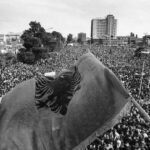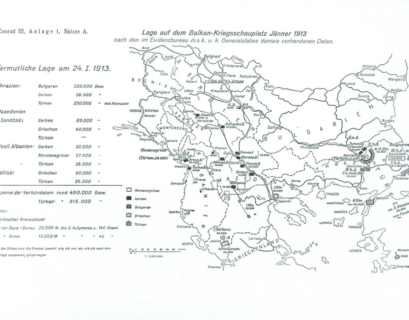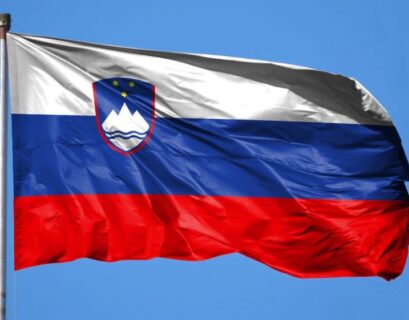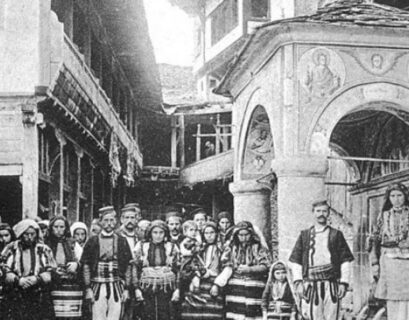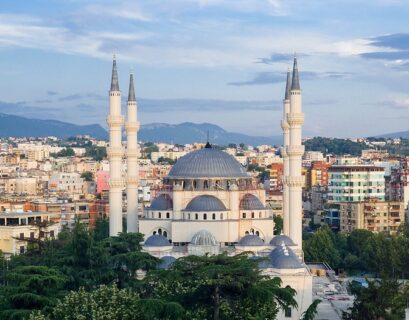By Altin Gjeta
Introduction
Albania experienced one of the harshest communist regimes in the world after communist party came to power at the end of World War II. Its rule lasted half of a century and it is estimated that 20% of the Albanian population was subject to interrogation, arrest, imprisonment, torture, or exile – while over 6,000 people were executed, many of whom were secretly buried in mass graves and whose bodies were never recovered. These crimes were perpetrated by an oppressive apparatus in the hands of the communist political leadership who built it to sow fear and obedience among the population. According to Austin and Ellison, Sigurimi, the communist’s regime secret service, employed some 10,000 full-time agents and a quarter of the adult population as part time informers (2008). This repressive security mechanism is estimated to have affected the lives of as much as one-quarter of the country’s total population.
The fall of the Berlin Wall in 1989 and particularly the anti-communist revolution in Romania triggered student’s anti-communist movements in Albania at the beginning of the 1990-s which overthrew Enver Hoxha’s lasting communist dictatorship. Admittedly this raised Albanians’ hopes for socio-political change, addressing the past state’s human rights abuses and thus redressing country’s communist historical narrative. However, as I have argued elsewhere, the regime change fell short of these aspirations as the ‘new’ elite showed lack of political will and consensus to sincerely deal with the past and prosecute perpetrators of human rights. Though initially Albania undertook some ambitious transitional justice measures such as criminal trails, lustration and reparatory legislation, it soon emerged a big gap between formal provisions and their implementation. This was due to the combination of politics of the past with the politics of the present where communist legacy in politics, judiciary and public administration, politicisation of the process and ill-faming of de-communisation laws played a significant role in hindering Albania to make e bold break with its communist past. This rendered transitional justice a futile enterprise which in turn has affected Albania’s direction of transition after the 90s.
In this paper I am particularly interested to look at a possible correlation between collective memory building and political discourse in post-totalitarian Albania. In this regard, in the first section I will dwell on how Albania failed to build a shared understanding over its communist’s regime human rights abuses and then in the second part I will analyse the implications this brought about to the political discourse of the political elite during the democratic transition.
Failing collective memory building in post-communist Albania
Teitel’s understanding of collective memory building contends that it is the process of reconstructing the representation of the past in light of the present through varying legal measures, such as the trials of the ancient regimes, or bureaucratic bodies convened for these purposes. In this respect, it is said that law can take a crucial role during transitions in shaping collective historical account by establishing facts about the past. For instance, facts brought to light by transitional justice practices facilitate the creation of a counter narrative to the totalising one and in turn establish a shared collective truth of past state’s wrongs. The inability Albania to deal with its totalitarian past has impeded the uncovering of the past state’s human rights abuses. This has undermined the establishment of a shared understanding and memory of its totalitarian past, which is misused by post-communist political elite to construct an anti-political narrative.
Surprisingly, grave human rights abuses of the communist regime are entirely absent in school textbooks today. According to a recent survey more than 60% of teachers were not aware about the number of victims of the communist regime because the country’s criminal past is not reflected in school curricula. In the same vein the head of the Federal Foundation for the Communist Legacy in Germany, Dr. Anna Kaminsky, contends that the Albania’s communist past it continues to be treated in school textbooks as a glorious period where big reforms in education, electrification and woman emancipation took place, while its substance was repression and victims. This has left manipulated totalitarian historical account in place, which as Aguilar maintains, becomes integrated into social institutions that act as collective memory archives. The negligence of post-communist Albania to deal with communist state’s human rights violations has basically left the youth who did not experience first-hand Hoxha’s regime without clear references to the past. According to Ignatieff public education in every post-conflict or post-authoritarian rule is important in order “to reduce the number of lies that can be circulated unchallenged in the public discourse”. In the absence of an official history regarding the communist regime’s abuses, youth has rested upon confusing information coming mainly from family members, media and communist period films produced by Kinostudio e Re which was part and parcel of its propaganda. This has created a conflicting assemblage of communist historical account among the youth, which in turn has neither helped the acknowledgment of victims’ sufferings, nor the reconstruction of a shared understanding about the communist regime’s wrongs.
In this regard, communist’s regime crimes have remained disputed, denied and recently its violent and degraded architecture has even been rehabilitated in the public life. For instance, three years ago a heated public discussion exploded over the Tepelena concentration camp where hundreds of thousands of people including children and elderly were interned from 1949 to 1953 and it is estimated that roughly 1000 people lost their lives due to physical torture and malnutrition (Kola, 2019; Kujto.al, no year). These wrongdoings were downplayed on grounds that conditions at the Tepelena camp were not that bad, thus relativizing past regime criminal legacy. The public discourse on the Tepelena concentration camp showed that if we rest merely on witnesses’ memory and fail to hold accountable the perpetrators, the state’s past wrongs will be denied and distorted by elites that served the official history of the old regime. Moreover, the successors of the Labour Party, the Socialist Party in power has gone beyond the common sense in attempting to redress the communist’s regime criminal memory. On the one hand Prime Minsters’ Rama government has downplayed Hoxha’s regime victims’ sufferings, demolished the National Theatre, left in shadow and forgetfulness the notorious communist era prisons Spac, Qafe Bari and Burrel, and on the other hand it has lavished communist’s regime violence symbols such as BunkArt, House of Leaves and most recently the Pyramid, a mausoleum built to incarnate Enver Hoxha’s cult in the centre of Tirana. Thereby, the failure of Albania to draw a thick line with its communist past has not even hindered but has whitewashed and rehabilitated people’s understanding of its communist regime criminal account. Another survey conducted by the OSCE Presence in Tirana, revealed that 62% of the respondents did not see the communist past as a problem. The most controversial figure was that when asked about the role of the former dictator Enver Hoxha in the history of the country, more than half of the respondents had a positive perception (OSCE, 2016). These concerning results show that Albanian’s society is not sufficiently informed about the dictatorship and has been unable to reckon with its communist past. This has strained truth revelation and a shared understanding of the communist past which in turn has dragged down Albania’s transition towards a functioning democracy where people are offered genuine political alternatives not empty signifiers such as the long-lasting dichotomy, communist versus anti-communist. This should have already been settled.
The emergence of the politics of anti-politics
It is widely believed that historical accountability sets off transition’s dynamics, is transformative and plays a forward-looking role in a country’s liberalisation process. No viable democracy can afford to accept amnesia, forgetfulness and the loss of memory. “An authentic democratic community cannot be built on the denial of past crimes, abuses, and atrocities”. Therefore, it is assumed that holding individuals accountable for crimes committed under the previous regime lays the foundation for a democracy committed to the rule of law and prevents future abuses under the new system. Thus, transitional justice is envisioned as a way to create a new foundation for state and societal rebuilding by making a break with the past and setting the directionality of transition. The failure of Albania to bring to justice wrongdoers of the communist regime has nurtured old elite continuation. This has constantly plunged the country into political crisis and undermined citizens’ political choices. In this vein, Krasniqi points out that “the new system continued to function as an appendix of the old system, and the main bearers of this were political parties and institutions they created”. This turned Albania into a fertile ground for political polarisation and the emergence of the unpolitical.
The political discourse in post-communist Albania is not framed around politics, by which democratic politics theorist Chantal Mouffe understands “the wide range of practices, discourses and institutions which aim to establish a peaceful co-existence of different conceptions over what constitutes a good or moral life”. To the contrary, the unsettled historical account of the communist past is misused to construct a divisive political narrative for electoral benefits into two antagonist camps, the anti-communists and the successor of the communists. This has not served the needs of citizens and democracy building but rather has hardened political polarisation. As Mouffe suggests if a political unit cannot transform antagonism into agonism it risks tearing apart the very social fabric of the society and dismantling democracy in the first place. Moreover, by emphasising the threat of ‘Communism’ versus ‘Berishizëm’, the latter referring to the former DP leader and anti-communist movement Sali Berisha, who became the main political player in Albania from 1991 to 2013, the unpolitical discourse deemphasised other internal social divisions and subsumed political alternatives what has in turn perverted democratic representation and political choice.
This April Albania held its 10th general elections since the fall of the communist regime. However, most electoral campaigns have not addressed peoples’ concerns and needs, but instead they have been dominated by anti-politics which merely intend degrading political opponents. Political articulation of different social strata’s problems is substituted by an empty narrative which portrays the opponent as the biggest evil who should be ostracised from the country. In 2009 elections the then SP leader Edi Rama declared that he is not a politician at all and denounced his opponent the then Prime Minister Sali Berisha as the symbol of the backwardness. Nevertheless, Rama’s party did not deliver any political manifesto where formers, labourers, teachers or other social groups’ needs were addressed rather he declared a total war against the ‘old politics’ without offering any alternative. On the other hand the Democratic Party has played the anticommunism card during the 90s and continues to use and reuse it for electoral benefits without genuinely addressing social groups’ needs. This has brought to the surface a deep crisis of representation in Albania, expressed in increasing public’s distrust towards political parties and public institutions in general.
These failures, coupled with the economic stagnation of Albania during these years and EU integration stalemate have nurtured popular disillusionment towards democratic system’s much proclaimed benefits. As post-communist Albania struggled to make progress and deliver tangible results for its population, the letter started feeling nostalgic for the past. This mass dissatisfaction has been politically harnessed by communist era politicians and ancient regime’s successors in politics to cling to power and thus protract Albania’s path towards a functioning democracy. The 2020 Freedom House report defines Albanian as a partly free country and a hybrid democracy, while in the same vein Transparency International ranks Albania as a highly corrupt country. What is more troubling is the fact that Albania is persistently sliding back as far as democratic practices are concerned which indicate that its already prolonged transition to a full-fledged democracy will continue.
Conclusion
After the fall of the communist regime, Albania had most historical credentials to undertake stringent transitional justice measures and thus bring to light its communist dictatorship gross human rights abuses. Nevertheless, as we have seen in this paper, though Albania initially introduced ambitious transitional justice legislation it failed at implementation stages altogether. As a result, the distorted communist’s regime narrative of the past remains untouched and its crimes aren’t uncovered and punished. To the contrary, paradoxically the communist past continues being portrayed in the public sphere as glorious period in education, women’s emancipation and public works. Its criminal account is relativised, and at some point denied and rehabilitated. Presumably this has hindered the establishment of a collective memory and understanding of the communist’s regime criminal account.
In turn, the inability of Albania to punish communist’s regime perpetrators and build a shared truth on its communist past has polarised the society, facilitated communist elite continuation and ultimately give birth the unpolitical discourse. The post-communist Albania’s political leadership kept misusing the uncovered and distorted past as an empty signifier for electoral benefits. The political discourse was dominated by an empty rhetoric and accusations with the reference to the past. As a consequence, social groups’ real needs and concerns were not addressed. This brought about an increasing popular dissatisfaction towards institutions, politics and democracy in general, and what is more troubling it has led to an increasing of nostalgic feelings towards the communist regime. These assemblages of failures, denials of communist’s regime abuses, the emergence of a crisis of representation and disillusionments towards democracy risk tearing apart the very social fabric of the society – and lastly hampering further Albania’s transition toward a functioning democracy.
References
Aguilar, P. (2002). Memory and amnesia: The role of the Spanish Civil War in the transition to democracy. Oxford: Berghahn Books.
Amy, L. (2013). Unresolved Histories: The Case of the Formerly Persecuted in Albania. Scholar Research Brief, 8, 1-7.
BalkanWeb. (2018). ‘Kampi i Tepelenës më i miri’, Pëllumb Xhufi: E vërtetojnë dokumentet e CIA-s. BalkanWeb, 3 April. Available from https://www.balkanweb.com/kampi-i-tepelenes-me-i-miri-pellumb-xhufi-e-vertetojne-dokumentet-e-cia-s-dhe-rrefimet-e-te-mbijetuarve/ [Accessed 19 May 2020].
Bebier, F. (2020). The Rise of Authoritarianism in the Western Balkans. Switzerland: Palgrave Macmillan.
Biberaj, E. (2000). Shqipëria në Tranzicion [Albania in Transition]. Tiranë: Ora Botime.
Edi Rama, speech, 11th Congress of the Socialist Party of Albania, 26 May 2007.
Exit Staff, (2020). Tirana Municipality Gets Permit to Reconstruct Pyramid, Exit.al. Available from https://exit.al/en/2020/06/16/tirana-municipality-gets-permit-to-reconstruct-pyramid/ [Accessed 28 March 2021].
Freedom House, (2020). Freedom in the World – Albania Country Report. Final report. Available from https://freedomhouse.org/country/albania/freedom-world/2020 [Accessed 15 July 2020].
Godole, J. (2018). Drejtësia tranzitore për komunizmin dhe sfidat e saj. Panorama, October 23. Available from http://www.panorama.com.al/drejtesia-tranzitore-per-komunizmin-dhe-sfidat-e-saj [Accessed 25 January 2020].
Godole, J. (2019). The young generation’s borrowed memory of the communist period, in: Godole, J. and Idrizi, I.(eds). Between Apathy and Nostalgia: Public and private recollections of communist in contemporary Albania. Tirana: IDMC.
Godole, J. (2020). Mësuesit mungesë informacioni për periudhën e komunizmit, Godole: Duhet ndërhyrje urgjente. ABC News, 14 February. Available from https://abcnews.al/mesuesit-mungese-informacioni-per-periudhen-e-komunizmit-godole-duhet-nderhyrje-urgjente [Accessed 13 May 2020].
Gjeta, A. (2019). Narrativa boshe e Ramës dhe nevoja e artikulimit ideologjik të PD. Politiko.al, 5 December. Available from https://politiko.al/narrativa-boshe-e-rames-dhe-nevoja-e-artikulimit-ideologjik-te-pd/ [Accessed 17 June 2020].
Gjeta, A. (2020b). Three Decades On, Albania Remains Hostage of Its Communist Past, Exit.al. Available from https://exit.al/en/2020/12/18/three-decades-on-albania-remains-hostage-of-its-communist-past/ [Accessed 7 January 2021].
Gjeta, A. (2020a). Transition without justice in post-communist Albania: Its implications to collective memory building and democracy promotion, Collection of Papers, OSCE Presence, Tirana: Albania.
IDM. (2018). Opinion poll, Trust in Governance. Final report, IDM Tirana: Albania
Ignatieff, M. (1998). The warrior’s honour: Ethnic war and the modern conscience. New York: Metropolitan Books.
Huntington, P.S. (1991). The Third Wave. Democratization in the Late Twentieth Century. London: Norman.
Kajsiu, B. (2010). Down with Politics! The Crisis of Representation in Post-Communist Albania. East European Politics and Societies, 24 (2), 229-253.
Krasniqi, A. (2012). Albania ‘Civil’ – An Infinite History of Transition. Unpublished Manuscript. Revista Illyrus, Albania.
Krasniqi, A. (2019). Everyone for and against communism: The paradox of the change in the political system 1990-1992 and of its memory. In: Godole, J. and Idrizi, I.(eds). Between Apathy and Nostalgia: Public and private recollections of communist in contemporary Albania. Triana: IDMC, 60-71.
Kola, R. (2019). Nderimi i viktimave në ish-Kampin e Tepelenës. Zeri i Amerikes, 9 February. Available from https://www.zeriamerikes.com/a/nderim-viktimat-kampi-i-tepelenes/4779945.html [Accessed 28 February 2020].
Koleka, B. (2020). Demolition of Albanian national theatre sparks angry protests, Routers, Availbale from https://www.reuters.com/article/us-health-coronavirus-albania-theatre-idUSKBN22T0FV [Accessed 7 March 2021].
Kujto.al. (no year). Arkiva Online e Viktimave të Komunizmit: Kampi i Tepelenes. Available from https://kujto.al/burg-kamp/kampi-i-tepelenes/ [Accessed 5 January 2020].
OSCE, (2016). Citizens understanding and perceptions of the Communist past in Albania and expectations for the future, OSCE Presence in Albania. Available from https://www.osce.org/albania/286821 [Accessed 18 May 2020].
Mouffe, Ch. (2000). The Democratic Paradox. Verso: London.
“Në Shqipëri e shkuara komuniste mungon në tekstet shkollore”, flet ekspertja gjermane. Panorama, 6 June 2019. Available from http://www.panorama.com.al/ne-shqiperi-eshkuara-komuniste-mungon-ne-tekstet-shkollore-flet-ekspertja-gjermane/ [Accessed 22 May 2020].
Teitel, G. R. (2000). Transitional Justice. Oxford: Oxford University Press.
Tismaneanu, V. (2008). Democracy and Memory: Romania Confronts Its Communist Past. ANNALS, 617, 166-180.
Transparency International. (2020). Examining State Capture: Undue Influence on Law-Making and the Judiciary in the Western Balkans and Turkey, Final Report, Available from https://www.transparency.org/en/publications/examining-state-capture# [Accessed 4 March 2021].
Altin Gjeta holds a Master of Arts in International Relations and Politics from University of Westminster, London. He is an independent researcher, columnist and visiting lecture in politics at University of Aleksander Moisiu, Durres.



